- Home
- Michael Chabon
The Final Solution Page 8
The Final Solution Read online
Page 8
“Nobody home,” Mr. Panicker said, pressing his forehead against the morning-cool steel of the grate. “We ought not to have come on a Monday.”
The old man raised his stick and struck the grate, again and again, with gleeful savagery, eyes alight at the clang and the ringing of steel. When he stopped, the shadowy population of the shop had been thrown or had thrown themselves into pandemonium. The old man stood with his stick held high, chest heaving, a fleck of spittle on his cheek. The clamor of the rage resounded and died. The light went from his eyes.
“A Monday,” said the old man sadly. “I ought to have foreseen this.”
“Perhaps you might have rung in advance,” Mr. Panicker said. “Made an appointment with this Black chap.”
“No doubt,” the old man said. He lowered his stick to the pavement and then, sagging, leaned heavily upon it. “In my haste I…” He wiped at his cheek with the back of a hand. “Such practical considerations seem to lie beyond my…” He lurched forward, and Mr. Panicker caught his arm, and this time the old man failed to shrug him off. His eyes stared as if blindly at the unanswering face of the shop, his face inhabited only by a hint of elderly alarm.
“There there,” Mr. Panicker murmured, seeking to ignore and conceal the brutality of his own disappointment at the sudden failure of their quest. He had begun the day sleepless, drunk, and contemplating the bombed-out house of his life as a man. His vacant marriage, his useless son, the eclipse of his professional ambitions, these were the shattered windows, the scorched wallpaper, and twisted fauteuils of that wreckage; and lying over all of it like a snowfall of ash, hanging in the air like an ineradicable pall of smoke, layer after charred layer reaching all the way down to bedrock, was the knowledge of his own godlessness, of his doubt and unbelief and the distance of his own heart from that of Christ the Lord. A minor Blitz, of no concern to anyone; the falling bomb—like all bombs a chance and mindless thing—the arrival and murder of Mr. Richard Shane. At the moment of impact the whole rotten structure had collapsed and it was as if, as Mr. Panicker had seen described in newspaper accounts of the Blitz, all of the hundreds of rats dwelling in the walls of the edifice were exposed, suspended and surprised in their customary leering attitudes, before their bodies came plopping to earth in a sickening gray shower of rat. And yet, as he had also read, from time to time such explosions had been known to discover the glint of odd and surprising treasure. Rare things, delicate things that, unknown, unobserved, had been there all along. This morning on the London road, when the old man had swept into the car in his mantle of wool and rain, it was as if the boy, Linus Steinman, bereft and friendless, had been thus revealed, standing tiny and alone in the midst of the heap of gray ash, eyes trained longingly on the sky. Mr. Panicker was not so hopeful or so foolish as to imagine that finding a refugee boy’s missing parrot would restore the meaning and purpose to his life. But he had been willing to settle for so very much less.
“Perhaps we might return another day. Tomorrow. We could put up in a hotel tonight. There’s a very decent little place I know.”
Abruptly Mr. Panicker’s earlier fantasy of the Crampton Hotel, with its really excellent breakfast, sprung, vividly and temptingly, back to life. Only now, in the place of seminars and presentations that even in fancy could only be imagined as repetitious and interminably dull there was, in the company of this mad old beekeeper, the unlikely possibility, all the more splendid for its unlikeliness, of adventure. The man seemed, in a way that Mr. Panicker would have been hard-pressed to explain or instance, not only to generate or to invite such a possibility but, somehow, implicitly to require a confederate in its undertaking. It was this possibility, even more than the sense of altruistic mission and opportunity for redemption represented by retrieval of a boy’s lost bird, that Mr. Panicker now found himself battling to sustain. For what, in the end, had drawn him, a gangly barefoot Malayalee country boy, into the life of a Minister of the Church of England? Naturally it had been a question—and so, to the point of tedium and nonsense, had he incessantly repeated over the past forty years—of one’s answering a call. Only now, however, did it occur to him that the call was neither, as he had once supposed, divine or mystical in origin nor, as he had later bitterly concluded, a kind of emotional ignis fatuus. How many rude and shoeless young men, he wondered, set off in search of adventure, believing with all their hearts that they were answering a summons from God?
“Come!” Mr. Panicker said. “Wait here. I will fetch the car. We’ll take a pair of rooms at the Crampton and arrange to meet this Black—we’ll lay a very trap for him!”
The old man nodded, slowly, his expression abstract, his eyes dull, barely registering the words. In the aftermath of his moment of confusion and alarm a deep melancholy seemed to have come over him. It was in stark contrast to the sense of readiness, of irrepressible fitness to continue the game, that now animated Mr. Panicker. He ran all the way to Boundary Street, leapt into the Imperia, and hurried back to retrieve his co-adventurer. As he neared Black’s shop the old man did not move. He stood hunched over, balanced on his stick, in precisely the same way in which Mr. Panicker had left him. Mr. Panicker pulled up alongside the curb and set the hand brake. The old man stood, gazing down at his great boots. After a moment Mr. Panicker sounded the horn, one two. The old man raised his head, slowly, and peered toward the front passenger window of the car as if he had no idea whom he might find within. Just before Mr. Panicker leaned over to roll the window down, however, the old man’s face suddenly altered. He arched an eyebrow, and his eyes narrowed slyly, and a long thin smile twisted one of the corners of his mouth.
“No, you fool!” he cried, as Mr. Panicker lowered the window. “Roll it back up!”
Mr. Panicker complied, and as he did so the grin on the old man’s face widened and spread very wonderfully, and he said something that Mr. Panicker failed to understand. He studied the window glass for a full minute—he might, it seemed to Mr. Panicker, have been examining his own reflection—smiling and saying the mysterious words to himself. Even when, having got into the car alongside Mr. Panicker, he repeated the words aloud, the minister found himself at a loss.
“Leg ov red!” the old man repeated inanely. “As is ever the case, ha ha, a matter of reflection! Leg ov red!”
“I—I’m sorry, sir. I fail to understand—”
“Quickly! What features characterize the Steinman boy’s scratchings in that notebook of his?”
“Well, he has the strange trait, of course, of reversing his words. Mirror writing. Apparently, according to the doctors, it’s related in some way to his inability to speak. Some sort of trauma, no doubt. And then I have noticed that he is an execrable speller.”
“Yes! And when, in what I now perceive to have been a pathetic plea for assistance, he scrawled the words ‘leg ov red’ on a bit of paper, he was neatly exhibiting both traits.”
“Leg ov red,” Mr. Panicker tried, projecting and reversing the letters against an interior screen. “Der… Vog … el.” Ah. “Der Vogel. He was asking after the bird. Of course.”
“Yes. And now, tell me what he was saying on the other side of the scrap.”
“Scrap?”
The old man thrust a bit of writing paper into his hands.
“This scrap. On which was written, by an adult man, young, with a Continental hand, the address of the very establishment before which we now sit. Dropped, or so I mistakenly concluded, by the proprietor himself.”
“Blak,” Mr. Panicker read. And then, reverse-projecting it: “Good God.”
10
He had seen madmen: the man who smelled of boiled bird-flesh was going mad.
He knew the smell of bird-flesh, for they ate it. They ate anything. The knowledge that the men of his home forests would burn and eat with relish the flesh of his own kind was a stark feature of his ancestral lore. In the first days of his captivity the contemplation of their bloody diet and the likelihood that he was being kept by them against the s
atiation of some future hunger so troubled and revolted him that he had fallen silent and chewed a bald place in the feathers of his breast. By now he was long accustomed to the horror of their appetities, and he had lost the fear of being eaten; insofar as he had observed them, these men, pale creatures, though they devoured birds in cruel abundance and variety, arbitrarily exempted his kind from slaughter. The bird they ate most often was the kurcze Hahne poulet chicken kip and it was this odor, of a chicken slaughtered and boiled in water with carrots and onions, that, for some reason, the man who was going mad exuded, even though he never appeared to eat anything more than toast and tinned sardines.
In the Dutchman’s house, by the harbor, on the island of his hatching, when he still feared the fires and teeth of these terrible apes with their strange, beguiling songs, he had gone, he supposed, slightly mad himself. As he watched the boiled-chicken man, Kalb, stalk back and forth across the room, hour after hour, the pelt of his head disordered, the pelt of his face grown thick, singing softly to himself, the parrot would creep, in unwilling sympathy, from one end to the other of his perch, and feel a certain comfort in so doing, and recall how, in those first fearful months with the Dutchman, he had passed hours making the same short journey, back and forth, silently chewing on his own plumage until he bled.
He had seen madmen. The Dutchman had gone mad, in fact; had killed with the knotted-up bones of his hands the girl who shared his bed, then drunk his own death in a glass of whisky spoilt by the worst-smelling substance that Bruno had yet encountered in his long life among men and their remarkable vocabulary of stenches. Whisky had a stench of its own, but it was one that Bruno during the later time of his tenure with le Colonel had learned to appreciate. (It had been ages now since anyone had offered whisky to Bruno. The boy and his family never drank it at all, and though he had often detected its acrid flavor on the breath and clothing of Poor Reggie, he had never actually seen Poor Reggie with a glass or bottle of the stuff in his hand.) Le Colonel had his bouts of madness, too, silent, lasting glooms into which he sank so far that his songlessness Bruno experienced as a kind of sorrow, though it was nothing like the sorrow that he felt now, having lost his boy, Linus, who sang in secret, to Bruno alone.
It was one of Linus’s old songs, the train song, that was driving Kalb mad, in a way Bruno did not entirely understand but that he appreciated and, it must be admitted, even encouraged. Kalb would come to stand before Bruno on his perch, with a sheet of paper in one hand and a pencil in the other, and beg him to sing the train song, the song of the long rolling cars. The room was filled with sheets of paper that the man had covered with claw marks, marks that Bruno understood to represent, in a manner whose principles he grasped but had never learned to master, the elements, simple and infectious, of the train song. Sometimes when the man left the room they shared, he would return with a small blue bundle of folded paper, which he tore open as if it were food and voided hungrily of its contents. Invariably and to Bruno’s bemused annoyance these contents turned out to be yet another sheet of little marks. And then the pleas and threats would begin again.
The man was standing there now, shoeless, shirtless, with just such a torn blue sheet of claw marks in his hand, muttering. He had come in not long before, breathing heavily from his climb up the steps of the high room, and exuding powerfully his characteristic smell of murdered and boiled bird.
“The routing prefix,” he kept saying to himself, bitterly, in the language of the boy and his family. This man could also speak in the language of Poor Reggie and his family, and once there had been a visitor—their single visitor—with whom the madman had easily conversed in the language of Wierzbicka, whose memory Bruno would always reverence, because it was Wierzbicka the sad-voiced little tailor who had sold Bruno to the boy’s family, in a transfer that Bruno had experienced, without quite knowing it at the time but thereafter retrospectively and certainly since losing Linus, as the sense and fulfillment of his long life’s pointless wanderings.
“There is no fucking prefix,” Kalb said. He lowered the sheet of blue paper and fixed his madman’s gaze on Bruno. Bruno set his head to an angle that, among his own kind, would have been understood as an eloquent expression of sardonic intransigence, and waited.
“How about some letters, for a change?” the man said. “Don’t you know any letters?”
Letters was in fact a concept that he grasped, or at any rate one that he recognized; it was the name of the bright bundles of paper that men ripped open so ravenously and watched so hopelessly with their darting white eyes.
“Alphabet?” Kalb tried. “A-B-C?”
Bruno held his head steady, but his pulse quickened at the sound. He was fond of alphabets; they were intensely pleasurable to sing. He remembered Linus singing his alphabet, in the tiny errant voice of his first vocalizations. The memory was poignant, and the urge to repeat his ABC bubbled and rose in Bruno until it nearly overwhelmed him, until his claws ached for the give of the boy’s slim shoulder. But he remained silent. The man blinked, breathing steadily, angrily, through his soft pale beak.
“Come on,” he said. He bared his teeth. “Please. Please.”
The alphabet song swelled and billowed, distending Bruno’s breast. As was true of all his kind there was a raw place somewhere, inside him, that singing pressed against in a way that felt very good. If he sang the alphabet song for the man, the rawness would diminish. If he sang the train song, which had lingered far longer and more vividly in his mind than any of the thousand other songs he could sing, for reasons unclear even to him but having to do with sadness, with the sadness of his captivity, of his wanderings, of his finding the boy, of the rolling trains, of the boy’s mama and papa and the mad silence that had come over the boy when he was banished from them, then the rawness would be soothed. It was bliss to sing the train song. But the alphabet song would do. He could just sing a little of it; just the beginning. Surely that could be of no possible value to the man. He shined his staring left eye at Kalb, fighting him as he had been fighting him for weeks.
“There is no fucking prefix,” Bruno said.
The man let out a sharp soft whistle of breath, and raised his hand as if to strike the bird. Bruno had been struck before, several times over the years. He had been throttled and shaken and kicked. There were certain songs that provoked such responses in certain people, and one learned to avoid them, or in the case of a very clever bird like Bruno, to choose one’s moments. It had been possible to torment le Colonel, for example, simply through the judicious repetition, in the presence of his wife, of certain choice remarks of le Colonel’s petite amie Mlle. Arnaud.
He raised one claw to ward off the blow. He prepared to snatch a moist chunk of flesh from the man’s hand. But instead of hitting him the man turned away, and went to lie down on the bed. This was a welcome development; for if the man fell asleep, then Bruno could permit himself to sing the alphabet song, and also the train song, which he sang, of course, in the boy’s secret voice, just as the boy had sung it to him, standing in the window at the back of Herr Obergruppenführer’s house, overlooking the railroad tracks, watching the endless trains rolling off to the place where the sun came up out of the ground every day, each piece of the train bearing the special claw marks that were the interminable lyrics of the train song. Because Kalb seemed to want so badly to hear the train song, Bruno was careful now only to sing it when the man was asleep, with the instinctive and deliberate perversity that was among the virtues most highly prized by his kind. The sound of the train song, arising in the middle of the night, would jar the man from his slumber, send him scrabbling for his pencil and pad. When at last he was awake, sitting in a circle of light from the lamp with pencil clutched in his fingers, then—of course—Bruno would leave off singing. Night after night, this performance was repeated. Bruno had seen men driven mad, beginning with that Dutchman on the island of Ferdinand Po, in the heat, with the endless humming of the cicadas. He knew how it was done.
&
nbsp; The doorbell rang, far below Kalb’s cramped room. Bruno heard it, and then, an instant later as always, the man heard it, too. He sat up, his head cocked at an angle that among parrots would have signified mild sexual arousal but that among apes denoted vigilance. Kalb was always alert to the comings and goings of the house, in which seventeen other humans, six of them female, dwelled, in separate quarters, only rarely exchanging their songs. Bruno could hear nine of the other humans now, heard their wireless sets, their coal hissing in the grate, the clack of a pair of knitting needles. And he could hear the voice of Mrs. Dunn, the landlady, far down at the bottom of the stairs. In reply came a male voice that he didn’t recognize. Then Bruno heard heavy treads on the stairway, three, no, four men, and Mrs. Dunn as well, but Kalb appeared not to remark this clamor until the climbers were well past the second-storey landing and still coming up.
At last Kalb flew to his feet and ran to press his ear to the door. He listened for a moment, then uttered a dark, harsh syllable much favored by Herr Obergruppenführer when he had lain on Papa’s couch, in the office at the back of the house by the railroad tracks, a stench on his boots that was almost as terrible as the smell of the Dutchman’s glass of death. Kalb spun from the door and cast his eyes wildly around the room, then turned to Bruno, his arms outspread, as though asking for assistance. But Bruno felt no inclination to help him, for Kalb was not at all a good man. He had taken Bruno from Linus, who needed Bruno and sang to him in a way that deeply repaid all the long years of suffering and captivity; and, what was more, Kalb was a killer of his fellow men—Bruno had seen him strike down the man called Mr. Shane, from behind, with a hammer. It was true, of course, that Mr. Shane had also been planning to take Bruno from Linus; nonetheless Bruno would never have desired his death, and hated the ineradicable memory of having witnessed it.
He determined to inform Kalb that he would not help him, even if somehow he could have done so, even if he understood what danger it was that now approached.

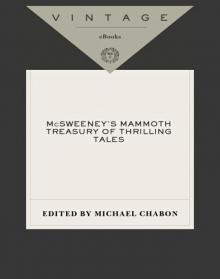 McSweeney's Mammoth Treasury of Thrilling Tales
McSweeney's Mammoth Treasury of Thrilling Tales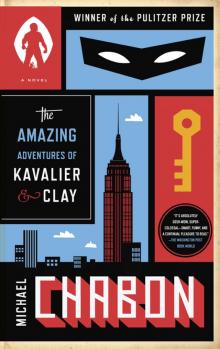 The Amazing Adventures of Kavalier & Clay
The Amazing Adventures of Kavalier & Clay The Yiddish Policemen's Union
The Yiddish Policemen's Union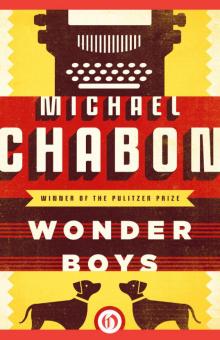 Wonder Boys
Wonder Boys Manhood for Amateurs
Manhood for Amateurs Kingdom of Olives and Ash: Writers Confront the Occupation
Kingdom of Olives and Ash: Writers Confront the Occupation Gentlemen of the Road: A Tale of Adventure
Gentlemen of the Road: A Tale of Adventure A Model World and Other Stories
A Model World and Other Stories Pops: Fatherhood in Pieces
Pops: Fatherhood in Pieces McSweeney's Enchanted Chamber of Astonishing Stories
McSweeney's Enchanted Chamber of Astonishing Stories Summerland
Summerland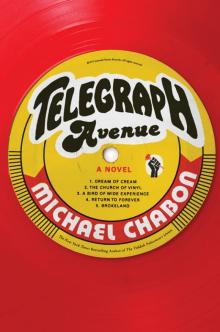 Telegraph Avenue
Telegraph Avenue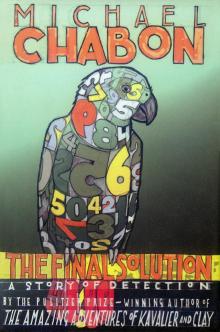 The Final Solution
The Final Solution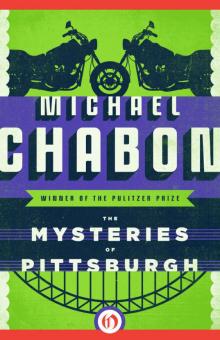 The Mysteries of Pittsburgh
The Mysteries of Pittsburgh Werewolves in Their Youth
Werewolves in Their Youth Bookends
Bookends Fight of the Century
Fight of the Century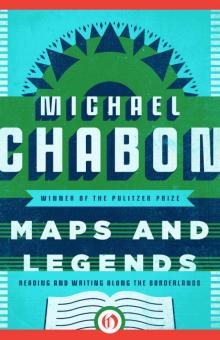 Maps and Legends
Maps and Legends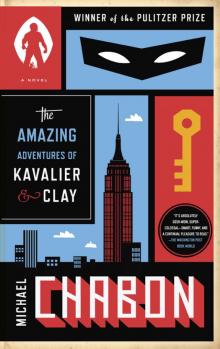 The Amazing Adventures of Kavalier & Clay (with bonus content)
The Amazing Adventures of Kavalier & Clay (with bonus content) Kingdom of Olives and Ash
Kingdom of Olives and Ash Pops
Pops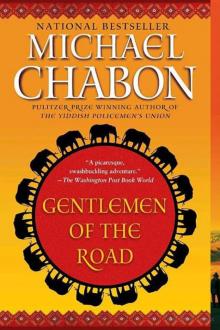 Gentlemen of the Road
Gentlemen of the Road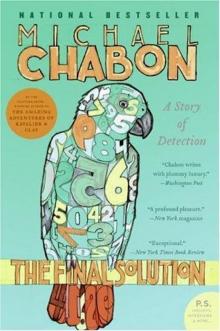 The Final Solution: A Story of Detection
The Final Solution: A Story of Detection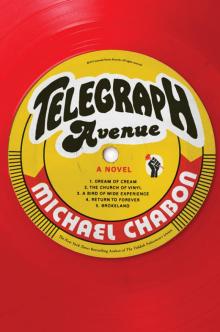 Telegraph Avenue: A Novel
Telegraph Avenue: A Novel